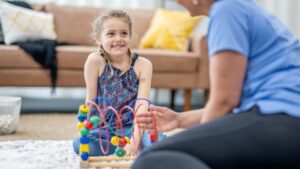Table of Contents
How Can Children with ASD Develop the Self-Care Skills They Need for Success and Independence?
Self-care skills are essential building blocks for fostering independence and confidence in children and teenagers with autism spectrum disorder (ASD). These vital life skills include everything from personal care, like hygiene and dressing, to emotional regulation and basic communication.
For many, these skills come naturally, but for some individuals on the autism spectrum, mastering them can be a challenge.
This often leaves families asking: How can we help our children with ASD develop the self-care skills they need to achieve success and independence?
The answer lies in understanding your child’s core needs while implementing practical strategies that address them. These include sensory sensitivities, communication barriers, and learning preferences. Many caregivers achieve this with the help of ABA therapy.
Through a personalized ABA approach, also known as applied behavior analysis, families help empower their children to master essential daily living skills while building confidence and self-assurance across many areas of life.
This blog by ABA Centers of Pennsylvania explores how developing these crucial abilities is possible through appropriate support and evidence-based approaches.
So, keep reading to learn more about this critical topic!
To explore more blogs by our center, visit us here. To learn more about ABA Centers of Pennsylvania, click here.
Understanding Self-Care Development for Children on the Autism Spectrum
According to Autism Speaks, self-care or life skills for children with autism encompass a wide range of daily activities that promote independence and well-being.
These life skills include, but are not limited to:
- Personal hygiene (e.g., brushing teeth, bathing, grooming)
- Dressing and clothing management
- Feeding and mealtime independence
- Toileting and bathroom routines
- Basic household tasks
- Emotional regulation and coping strategies
- Social communication for self-advocacy
Children with autism may face unique challenges in developing these skills due to various ASD-related factors, such as sensory sensitivities, difficulty completing multi-step tasks, or communication barriers.
However, with the proper support and ABA therapy, children can successfully overcome these obstacles and apply their learning to future challenges.
7 Evidence-Based Strategies for Building Self-Care Skills in Children with Autism
1. Task Analysis and Step-by-Step Learning
Breaking multi-step self-care routines into manageable steps makes learning more achievable for many on the spectrum. For example, teaching tooth brushing step by step.
- Get the toothbrush
- Apply the toothpaste
- Brush each section
- Rinse
2. Visual Supports and Schedules
Visual aids significantly enhance learning for children with autism. Picture schedules, step-by-step cards, and visual reminders help children understand expectations and follow routines with less verbal and physical prompting.
3. Consistent Routines and Structure
Establishing predictable daily routines helps neurodivergent children feel more secure while practicing independence. This consistency also builds confidence and reduces anxiety around trying new tasks.
4. Sensory Considerations
Addressing sensory needs is crucial for self-care skill development. Sensory considerations may involve using preferred textures, adjusting lighting, or incorporating sensory breaks into routines.
5. Positive Reinforcement Strategies
ABA therapy incorporates consistent positive reinforcement techniques to encourage skill building. For example, celebrating self-dressing or other routines with a child’s highly preferred activities builds motivation and creates positive associations with self-care.
6. Gradual Independence Building
Starting with hand-over-hand assistance while learning life skills and then gradually reducing prompts helps children develop independence over time. It also helps establish positive feelings about their new skills while limiting overwhelm.
7. Family Collaboration and Consistency
Success happens when children consistently apply strategies across all environments, including home, school, and therapy settings, as well as across professionals and parents.
How ABA Therapy Transforms Self-Care Learning
ABA therapy provides a structured, evidence-based approach to teaching self-care skills that addresses each child’s unique learning style and needs.
Through detailed assessments and individualized programming, ABA professionals can:
- Identify specific skill deficits and strengths
- Develop targeted intervention plans
- Use data-driven approaches to track progress
- Modify strategies based on individual responses
- Collaborate with families to ensure consistency
The benefits of ABA therapy for self-care development include improved independence, increased confidence, better quality of life, and enhanced family dynamics.
Self-Care for Children with Autism Opens the Door to More Independent Living
Living skills for children with autism are often the doorway to independent living, jobs, and a fulfilling life. By focusing on the development of positive self-care skills through ABA therapy, families can empower their children to overcome challenges and embrace their unique potential.
Building Independence with ABA Therapy at ABA Centers of Pennsylvania
At ABA Centers of Pennsylvania, we believe that developing independence in children with autism requires a collaborative approach between families, ABA specialists, and the children we serve.
Our comprehensive ABA programs address not just the mechanics of self-care routines but also the underlying skills that support their long-term application.
By working together to identify your child’s specific needs and implementing evidence-based strategies, we can help your family build the foundation for lifelong independence and success.
Ready to Empower Your Child’s Independence Through Targeted Self-Care Skills Development?
Schedule your free ABA consultation online today or call us at (844) 444-7496. Discover how our personalized approach to ABA can help your child develop the life skills they need to thrive.
Our experienced team at ABA Centers of Pennsylvania is here to support your family’s journey toward greater freedom and confidence.








